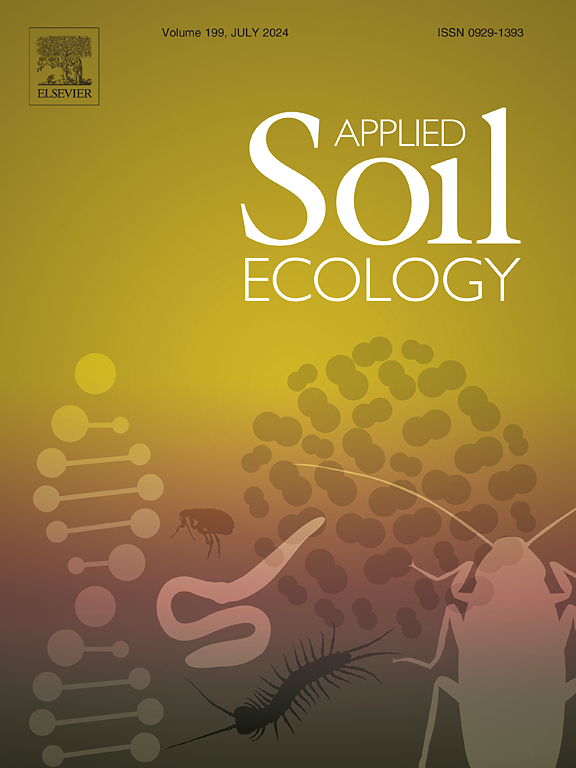Phenolic acids alleviated consecutive replant problems in lily by regulating its allelopathy on rhizosphere microorganism under chemical fertiliser reduction with microbial agents in conjunction with organic fertiliser application
IF 4.8
2区 农林科学
Q1 SOIL SCIENCE
引用次数: 0
Abstract
Abstracts
Phenolic acids play a crucial role in regulating soil microecosystem functions, and their accumulation is a significant factor contributing to the problems associated with consecutive replant problems. Soil quality can be enhanced significantly by reducing chemical fertiliser usage and by incorporating bio-organic fertilisers. In this study, we designed two types of fertiliser reduction treatments, with reductions of 30 % and 50 %, supplemented with microbial agents and organic fertilisers, respectively. To investigate the effect of phenolic acids on the growth of perennial vegetables (edible lily) by regulating their allelopathic interactions with microorganisms in replanted soil under reduced fertiliser mode. The results indicated that these fertiliser reduction treatments led to improvements in soil physicochemical indices and reductions in total phenolic acid content. Furthermore, the treatments slowed the loss of soil microbial diversity and optimised microorganism structures, namely important functional bacteria (such as Proteobacteria phylum, the genus Sphingomonas, Bacillus, etc.) and endophytic fungi accumulated, whereas pathotrophic fungi and plant pathogenic fungi reduced. PICRUSt2 analysis suggested an enhancement in bacterial metabolism related to phenolic acid degradation. Correlation analyses highlighted that the allelopathic inhibition of total phenolic acid and some of its fractions (such as vanillin, benzoic acid, and cinnamic acid) on endophyte colonisation and plant autotoxicity, and allelopathic enhancement of Sphingomonas colonisation by phthalic acid, contributed to microorganism structure optimisation. Thus, phenolic acids influenced soil function by modulating their allelopathic effects on microorganisms. Reducing fertiliser by 30 %, supplemented with microbial agents and appropriate organic fertilisers, is an effective strategy to improve the yield and quality of lily bulbs. With the use of organic fertilisers and suitable microbial agents, this fertiliser mode can be effectively utilised to promote the sustainable production of economic perennial crops in the mountainous regions of northwestern China.
酚酸通过调控百合根际微生物化感作用,缓解了有机肥减施下百合连续再植问题
摘要酚酸在调节土壤微生态系统功能中起着至关重要的作用,其积累是导致连作问题的重要因素。土壤质量可以通过减少化肥的使用和加入生物有机肥来显著提高。在本研究中,我们设计了两种减肥处理,减肥量分别为30%和50%,分别辅以微生物剂和有机肥。探讨酚酸通过调节复植土壤中多酚酸与微生物的化感作用对多年生蔬菜(可食百合)生长的影响。结果表明,减肥处理改善了土壤理化指标,降低了总酚酸含量。此外,这些处理减缓了土壤微生物多样性的丧失,优化了微生物结构,即重要的功能细菌(如变形菌门、鞘氨单胞菌属、芽孢杆菌等)和内生真菌的积累,而致病性真菌和植物致病性真菌的减少。PICRUSt2分析表明,与酚酸降解相关的细菌代谢增强。相关分析表明,总酚酸及其部分组分(如香兰素、苯甲酸和肉桂酸)对内生菌定植和植物自毒性的化感抑制作用,以及邻苯二甲酸对鞘氨单胞菌定植的化感增强作用,有助于微生物结构优化。因此,酚酸通过调节其对微生物的化感作用来影响土壤功能。减少30%的肥料,辅以微生物剂和适当的有机肥,是提高百合鳞茎产量和品质的有效策略。通过施用有机肥和适宜的微生物制剂,可以有效地利用这种施肥模式促进西北山区经济多年生作物的可持续生产。
本文章由计算机程序翻译,如有差异,请以英文原文为准。
求助全文
约1分钟内获得全文
求助全文
来源期刊

Applied Soil Ecology
农林科学-土壤科学
CiteScore
9.70
自引率
4.20%
发文量
363
审稿时长
5.3 months
期刊介绍:
Applied Soil Ecology addresses the role of soil organisms and their interactions in relation to: sustainability and productivity, nutrient cycling and other soil processes, the maintenance of soil functions, the impact of human activities on soil ecosystems and bio(techno)logical control of soil-inhabiting pests, diseases and weeds.
 求助内容:
求助内容: 应助结果提醒方式:
应助结果提醒方式:


